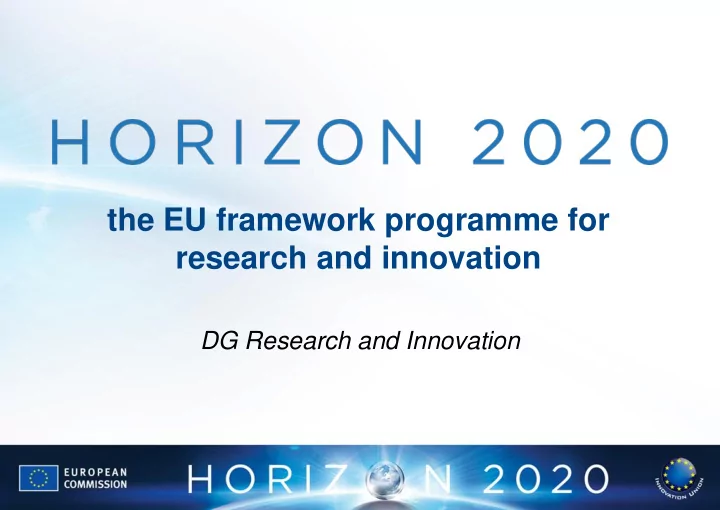

the EU framework programme for research and innovation DG Research and Innovation
The Multiannual Financial Framework 2014-2020: Commission’s proposals of 29 June 2011 Smart & inclusive growth ( € 491bn) 1. Horizon 2020 Education, Competitive Connecting Cohesion Youth, Sport Business SMEs Europe 2. Sustainable growth, natural resources ( € 383bn) 3. Security and citizenship ( € 18.5bn) 4. Global Europe ( € 70bn) Total: 5. Administration ( € 62.6bn) € 1,025bn
Impact of R&D on economic recovery 4,0 SE FI 3,5 Average R&D investment, 2004-2009 3,0 DK DE AT 2,5 FR 2,0 BE UK NL LU 1,5 CZ IE ES PT IT EE 1,0 PL HU EL 0,5 RO LT LV SK BG CY 0,0 -5,0 -4,0 -3,0 -2,0 -1,0 0,0 1,0 2,0 3,0 4,0 5,0 6,0 GDP growth, 2010
What is Horizon 2020 • Commission proposal for a 80 billion euro research and innovation funding programme (2014-20) • Part of proposals for next EU budget, complementing Structural Funds, education, etc. • A core part of Europe 2020, Innovation Union & European Research Area: – Responding to the economic crisis to invest in future jobs and growth – Addressing peoples’ concerns about their livelihoods, safety and environment. – Strengthening the EU’s global position in research, innovation and technology
What’s new • A single programme bringing together three separate programmes/initiatives* • More innovation , from research to retail, all forms of innovation • Focus on societal challenges facing EU society , e.g. health, clean energy and transport • Simplified access , for all companies, universities, institutes in all EU countries and beyond. *The 7th research Framework Programme (FP7), innovation aspects of Competitiveness and Innovation Framework Programme (CIP), EU contribution to the European Institute of Innovation and Technology (EIT)
Three priorities: 1 Excellent science 2 Industrial leadership 3 Societal challenges
Priority 1 Excellent science Why: • World class science is the foundation of tomorrow’s technologies, jobs and wellbeing • Europe needs to develop, attract and retain research talent • Researchers need access to the best infrastructures
Proposed funding (million euro, 2014-20) European Research Council 13 268 Frontier research by the best individual teams Future and Emerging Technologies 3 100 Collaborative research to open new fields of innovation Marie Curie actions* 5 572 Opportunities for training and career development Research infrastructures (including e-infrastructure) 2 478 Ensuring access to world-class facilities
Priority 2 Industrial leadership Why: • Europe needs more innovative SMEs to create growth and jobs • Strategic investments in key technologies (e.g. advanced manufacturing, micro-electronics) underpin innovation across existing and emerging sectors • Europe needs to attract more private investment in research and innovation
Proposed funding (million euro, 2014-20) Leadership in enabling and industrial 13 781 technologies ( ICT, nanotechnologies, materials, biotechnology, manufacturing, space) Access to risk finance 3 538 Leveraging private finance and venture capital for research and innovation Innovation in SMEs 619 Fostering all forms of innovation in all types of SMEs
Priority 3 Societal challenges Why: • EU policy objectives (climate, environment, energy, transport etc) cannot be achieved without innovation • Breakthrough solutions come from multi-disciplinary collaborations, including social sciences & humanities • Promising solutions need to be tested, demonstrated and scaled up
Proposed funding (million euro, 2014-20) Health, demographic change and wellbeing 8 033 Food security, sustainable agriculture, marine and 4 152 maritime research & the bioeconomy Secure, clean and efficient energy* 5 782 Smart, green and integrated transport 6 802 Climate action, resource efficiency and raw materials 3 160 Inclusive, innovative and secure societies 3 819 *Additional € 1 788m for nuclear safety and security from the Euratom Treaty activities (2014-18). Does not include ITER.
“Smart, green and integrated” Transport in “Horizon 2020” • The challenge: to achieve a transport system that is • resource efficient • environmentally friendly • safe and seamless • for the benefit of citizens, economy and society • The logic: • a holistic approach… • …that recognises modal specificities; • that is focused on the societal challenges… • …and takes into account the imperatives of competitiveness.
Next steps From 30/11: Parliament and Council negotiations on the basis of the Commission proposals Ongoing: Parliament and Council negotiations on EU budget 2014-20 (including overall budget for Horizon 2020) Mid 2012: Final calls under 7th Framework Programme for Research to bridge gap towards Horizon 2020 By end 2013: Adoption of legislative acts by Parliament and Council on Horizon 2020 1/1/2014: Horizon 2020 starts; launch of first calls
Thank you for your attention! Find out more: www.ec.europa.eu/research/horizon2020
Recommend
More recommend